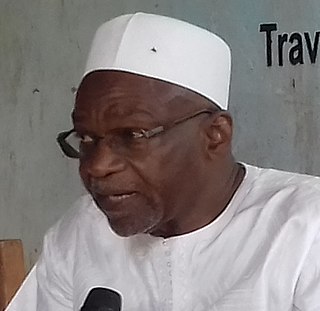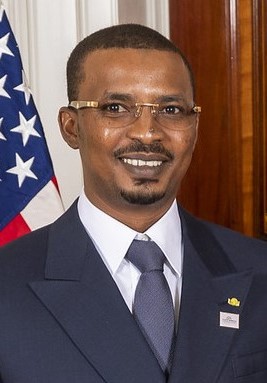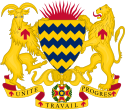Chad, officially the Republic of Chad, is a landlocked country in Central Africa. It borders Libya to the north, Sudan to the east, the Central African Republic to the south, Cameroon and Nigeria to the southwest, and Niger to the west. Due to its distance from the sea and its largely desert climate, the country is sometimes referred to as the "Dead Heart of Africa".

The politics of Chad take place in a framework of a presidential republic, whereby the President of Chad is both head of state and head of government. Executive power is exercised by the government. Legislative power is vested in both the government and parliament. Chad is one of the most corrupt countries in the world.

Idriss Déby Itno was a Chadian politician and military officer who was the 6th president of Chad from 1991 until his death in 2021 during the Northern Chad offensive. His term of office of more than 30 years makes him Chad's longest-serving president.

The Patriotic Salvation Movement is the ruling political party in Chad.

Nagoum Yamassoum is a Chadian politician who was Prime Minister of Chad from 1999 to 2002 and Minister of State for Foreign Affairs from 2003 to 2005. He is from the district of Grande Sido in the region of Moyen Chari.
The Union for Renewal and Democracy is a political party in Chad. Its current president is Sande Ngaryimbé, its first being Wadel Abdelkader Kamougué.

Chad holds elections on national level for a head of state – the president – and a legislature. The president is elected for a five-year term by the people. The National Assembly has 155 members, elected for a four-year term in 25 single-member constituencies and 34 multi-member constituencies. Chad is a one party dominant state with the Patriotic Salvation Movement in power, although according to the African Union, elections in Chad are generally free and fair. Human Rights Watch, however, has criticized the election process in Chad, arguing that they have problems such as electoral fraud, multiple voting, underage voting, and low voter turnout.

Saleh Kebzabo is a Chadian politician. He is the President of the National Union for Democracy and Renewal (UNDR) and a Deputy in the National Assembly of Chad. He was designated Prime Minister by president Mahamat Déby on 12 October 2022.
Nouradine Delwa Kassiré Koumakoye is a Chadian politician and the head of the National Rally for Development and Progress (VIVA-RNDP) political party. After serving as a minister in the government during the 1980s and early 1990s; he was Prime Minister of Chad from November 6, 1993 to April 8, 1995 and again from February 26, 2007 to April 16, 2008. In 2008, he became President of the Economic, Social and Cultural Council.
Wadel Abdelkader Kamougué was a Chadian politician and army officer. Kamougué was a leading figure in the 1975 coup d'état and subsequently held several positions in the Chadian government and legislature. He was Vice President of Chad from 1979 to 1982 and President of the National Assembly from 1997 to 2002. Kamougué was also President of the Union for Renewal and Democracy (URD) political party, and he was appointed as Minister of National Defense in April 2008.
Jean Alingué Bawoyeu, known in French as the vieux sage, which translates as "wise elder", is a Chadian politician who was Prime Minister of Chad from 1991 to 1992. During the 1970s, he served successively as Ambassador to the United States and France. Later, he was President of the National Assembly in 1990. He served in the government as Minister of Justice from 2008 to 2010 and as Minister of Posts and New Information Technologies from 2010 to 2013.
Lol Mahamat Choua was a Chadian politician who served as his country's head of state for four months in 1979. He was the President of the Rally for Democracy and Progress (RDP) political party.

Presidential elections were held in Chad on 3 May 2006. A referendum in 2005 had led to changes to the constitution that made it possible for President Idriss Déby to run for a third term; having come to power in December 1990, he had previously won elections in 1996 and 2001. Despite a serious rebellion based in the east of the country, the elections were held on schedule; Déby was re-elected with about 65% of the vote, according to official results. The main opposition parties boycotted the election.

Presidential elections were held in Chad on 20 May 2001. Incumbent President Idriss Déby of the Patriotic Salvation Movement was re-elected with 63% of the vote.

Ngarlejy Koji Yorongar le Moinban is a Chadian politician. He is the Executive Federal Coordinator of the Federation, Action for the Republic, a radical opposition party, as well as a Deputy in the National Assembly of Chad and President of the Federation Parliamentary Group.

A constitutional referendum was held in Chad on 31 March 1996 to approve or reject the new constitutional draft meant to definitively replace the Transitional Charter established by the Sovereign National Conference in 1993. It was approved by 63% of voters with a 61% turnout.

Mahamat Idriss Déby Itno is a Chadian politician and military officer who has been the leader of Chad since 2021, first as President of the Transitional Military Council from 2021 to 2022, then as Transitional President from 2022 to 2024, and then as the 7th President since 2024 following his victory in the presidential elections. He is widely known in Chad by his nickname Kaka. He is also the General Secretary of the Patriotic Salvation Movement since 2022. He gained power on 20 April 2021, succeeding his father and predecessor, Idriss Déby, who died in action while commanding troops in the Northern Chad offensive. He previously served as the second in-command of the military for the Chadian Intervention in Northern Mali (FATIM).

Presidential elections were held in Chad on 10 April 2016. Incumbent President Idriss Déby was re-elected for a fifth term.

Presidential elections were held in Chad on 11 April 2021. Incumbent Idriss Déby, who served five consecutive terms since seizing power in the 1990 coup d'état, was running for a sixth. Déby was described as an authoritarian by several international media sources, and as "strongly entrenched". During previous elections, he forbade the citizens of Chad from making posts online, and while Chad's total ban on social media use was lifted in 2019, restrictions continue to exist.

Presidential elections were held in Chad on 6 May 2024. The elections followed a constitutional referendum held on 17 December 2023, following the death of President Idriss Déby in 2021. Incumbent transitional president Mahamat Déby, the son of Idriss Déby, ran as the candidate of the Patriotic Salvation Movement, winning the election and leading to another extension of 34 years of rule by the Déby family.









